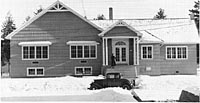|
Portland
YWCA Buildings
Document
1
Document
2
Early
Efforts

Mid-Century
Growth
Recent
Changes

|
Building
Buildings: Mid-Century Growth
Research by
Rose M. Murdock, Tracy Christensen, and Patricia A. Schechter

The
stress of World War I created incentives to extend YWCA programming
throughout the city of Portland. The presence of troops and the mobilization
of women workers created new demands for support, mentoring, and services,
especially for young people. In 1918, women in the Northeast and North
Portland neighborhoods made their voices heard at the downtown center.
 |
|
St.
John's, 1937
|
In
the northern area, formerly the town of St. John's, programming began
in the old city hall with rugs, a piano, and plants added to make a "club
room" for war work. Here women knitted and sewed for the war effort
and a program for camp fire girls in addition to YWCA clubs was held.
During the 1920s, the St. John's program moved from city hall to a nearby
Baptist Church and then to the Congregational Church. The Great Depression
brought both opportunity--in the form of cheap land on Charleston Avenue
and N. Leonard--and severe financial stress that almost closed the program.
In 1936, a community study was done and the downtown YWCA board backed
a new, slightly expanded budget for St. John's that included contruction
of a new building on the Charleston Avenue lot. Almost $10,000 in additional
support from the surrounding business community was essential to completing
the building in 1937. In the words of long-time St. John's YWCA staff
secretary, Ina Shaw: "Splendid co-operation with all groups in the
community has unified and promoted a spirit of good will that has fostered
friendship, kindliness, and satisfaction in the work program of the YWCA."[1]
The YWCA partly renovated the buildings in the mid-1980s, and today St.
John's is a major provider of senior services in the Portland area.
 |
|
Williams
Avenue Branch
|
The
Williams Avenue YWCA's Committee of Management drew African-American women
from a cross-section of the Portland community, especially educators,
church leaders, and aspiring professional women. Marie
Smith was a leading member of the Committee from the time of its founding
in the late teens, and Dura E. Rice was an especially dedicated and effective
staff leader in the 1930s and 40s. Programming ran the gamut, including
Girl Reserves, bible classes, musical groups, mothers' clubs, women's
clubs, social and gymnasium activities, a weekly community theatricals
night, and a boys' program partly overseen by the YMCA. The Williams Avenue
YWCA also served as a base for some anti-racism activism, with its staff
overseeing the completion of a study in 1936 that found that despite full
voting rights, African Americans faced significant discrimination in employment,
union access, government services, and housing.[2]
In
contrast to the chamber of commerce and white YWCA leadership support
that buoyed the St. John's branch development, black women struggled
mightily to secure the financial and political support needed to maintain
the Williams Avenue facility. Despite their cooperation with the USO's
request to forfeit their building "for the duration" in order to house
black soldiers and their accommodation to the ambiguities of the YWCA's
post-war desegregation intiative, the Portland YWCA board recoiled from
meeting the black community's needs--which included boys' work and activities--in
the 1950s. Executive Director Essie Maguire called the program at Williams
"really a queer thing" because it took on "activities and interests
not purely those along the objectives and purposes of the YWCA."[3]
As plans for a new building downtown heated up, board support for maintaining
Williams evaporated and the building was closed and sold in 1959, just
as the Civil Rights Movement was gaining momentum.

1.
Ina L. Shaw, "History of the St. Johns Branch YWCA," 15
April 1938, Portland YWCA Archives, Portland, Oregon.
Back
to Text
2.
"Study of Basic Civil Rights for Negroes Made by the Young Women's
Christian Association of Portland, Oregon," March 1936, YWCA National
Records, New York City (Microfilm, Reel #207).
Back
to Text
3.
"Williams Avenue YWCA Study," April 1956, and Essie L. Maguire to
Irma T. Huppel, 26 April 1950, both in Williams Avenue Pages, Oregon
Historical Society, Portland, Oregon. Quotation from Report by Essie
L. Maguire, 30 January 1956, Sale of Building File, Portland YWCA
Archives, Portland, Oregon.
Back
to Text

|
YWCA
Today | Programs | African-American
Women |
| Asian-American Women | World
War II | Religion, Race, & Reform |
Camping |
|
![]()




